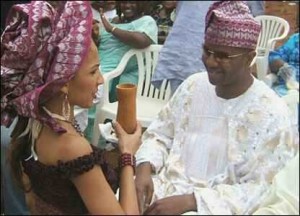By Chinedu C. Ikeanyi, Los Angeles, California
Experts have long predicted that Igbo language will become extinct during the next two decades. The larger picture is that our entire culture (of which language is a part) is becoming extinct. As such, the current effort to preserve Igbo language must be expanded to include other aspects of our culture that are at risk. The tendency to replace many symbols of our culture with money and other quick fixes is damaging. Using money as a substitute for observing our cultural norms and practices is not only injurious to our culture but shows evidence of a total disregard for the relics and traditional norms that make our people unique and special. Cultural preservation must include adherence to the procedures and timelines for performing the rites associated with our traditional institutions, activities and events. To preserve the beauty of Igbo culture, we must promote the symbols, products, and artifacts used to perform those rites without cutting corners. And to the extent practically and legally possible, we need to abide by the timelines prescribed for traditional Igbo events.
Let me illustrate with the rites and rituals associated with Igbo traditional marriage. I wish to state upfront that I am approaching this issue as an Igbo cultural enthusiast, not an expert. My intent is to shine a light on the aspects of our culture that are becoming extinct like our language. My expectation is for people to participate in expanding this debate, hopefully to save our customs and traditions. In Igboland, using Anambra state and my own town Enugwu-Agidi as an example, there are five basic stages involved in a marriage ceremony. Each of these stages requires the performance of certain rites in order to ensure completion and adequate compliance to our tradition. Some stages may require more steps than others, but are no less important. The five stages of traditional Igbo marriage are: 1. Inquiry (Iku Aka), 2. Dowry (Ime Ego), 3. Traditional Wedding (Okuku Onye Nolu Uwa), 4. A Feast for the Father of the Bride (Igbu Ewu Nna or Igba Nkwu), and 5. Familiarization Visit (Ogo Malu Uno). Below, I will offer a brief description of each step, the purpose it serves, as well as the cultural expectations.
The Inquiry Stage (Iku Aka) is when a suitor who finds a potential bride takes the necessary steps to inquire about her family background. The first act here is to visit his prospective father in-law with a bottle of liquor to discuss his intentions. Ideally, the visit should occur only after the suitor has obtained an assurance from the wife-to-be that she is interested in the relationship. However, this does not preclude some overzealous suitor from knocking on that door, knowing full well that a father can easily override his daughter’s wish. The traditional item to take along for this inquiry visit is just one bottle of liquor, not a bag of Ghana must go (wads of cash). Don’t monetize it. Keep it real and original.


Payment of Dowry (Ime Ego) is the second stage. This stage follows after both families, the family of the bride and the groom, have inquired about each family’s social-moral uprightness, criminal backgrounds, values, longevity (average age of death among the members of each family) and predisposition to certain diseases, including mental illness. They then determine if either family is “clean enough” to be associated with in marriage. The inquiry must include the family lineage of one’s birth to ensure that neither family is an outcast dedicated to a deity. An outcast or osu is a descendant of a family who was presented to a god or goddess as a gift. It is also believed that certain osu people voluntarily sought refuse with deities. It is considered a taboo or an abomination to accept those people or intermarry with them. For this stage to be performed with fidelity, certain tangible items must be presented and utilized during the ceremony: a bundle of broomsticks, cases of beer, kolanuts, and money. These norms and customs constitute integral aspects of our culture. They should be practiced and sustained as originally conceived. For example, the broomsticks are used to negotiate the bride price, which is a symbol of love. The purpose is to underscore the fact that a bride is not a commodity that is being bought or sold, and that is why real money is not used or mentioned during the negotiations. Dowry payment is simply a gesture of appreciation as well as the significance of a wife in a man’s life. The recent trend, however, is to bypass these specific rites and simply pay for all the items in cash.
Just recently, I took my American-born son to a marriage event to observe the Dowry ceremony. I promised him an opportunity to see my stories about the marriage rites in practice. Unfortunately, we were totally disappointed, as the event did not live up to our expectations. None of the expected rites was performed. The father of the prospective suitor simply handed over a large envelope of cash to the bride’s father, and everyone clapped and continued to drink. The suitor’s father added, “This envelope will take care of everything on the list given to us. If you want more, let us know. Anyi noo down! No shaky! ”Every aspect of the ceremony was monetized. Not even the kolanut that was presented at the beginning of event was from Igboland. My son who had waited in vain to witness the dowry negotiation with brooms was disappointed. It was a gross abuse of our custom. I emphasized the phrase “continued to drink” because ideally, no participant at a Dowry event should drink or eat anything with the exception of the “welcome kolanut” before the potential bride has openly confirmed that she will marry the suitor by kneeling down, taking a sip of wine and handing it over to the suitor to finish. It is only after this acceptance is made that the mission is considered to be accomplished. Only then are the rest of the participants free to eat and drink anything offered to them.
The third stage of marriage is the Traditional Wedding (Okuku Onye Nolu Uwa). Again, using Enugwu-Agidi town, as a reference point is the rite performed when a bride informs the spirit of the person who reincarnated her that she (the bride) is getting married and transitioning into a new phase of life. The Igbos believe in reincarnation; they believe that when someone dies, the spirit of the deceased returns back to the family in the form of a newborn. The purpose of this ceremony is to notify the spirit of the deceased person whom the family believes to have reincarnated as the bride that the bride is about the leave the family to begin a new life as a married person. During this event, which also occurs at the home of the bride’s parents, a fowl is slaughtered and used to cook a meal for the couple. This ceremony marks the first time the bride and groom will eat a meal together. This stage is actually perceived as the traditional wedding as well as the most important stage of marriage. Why is this stage the most important in any traditional marriage? Because a husband cannot claim as his, any child or children born by the couple if this ceremony is not performed before the child’s birth. Without this stage, any child born to the couple legally belongs to the bride’s family, according to Igbo custom and tradition. The recent trend in some families is to monetize or bypass this stage and accelerate straight to the church wedding and stage four – Igbu Ewu Nna or Igba Nkwu. It is a mockery of our culture and should be discouraged.

The fourth stage is the Feast for the Father of the Bride (Igbu Ewu Nna or Igba Nkwu). Again the venue for this event is the residence of the bride’s father. This is the time when the new son in-law slaughters a goat for the father of the bride. This stage involves many more people beyond the immediate and extended families of the couple. Unlike in other stages, this may be the first time the husband will be inviting all his friends, well-wishers, colleagues, classmates and the entire public to his marriage event. Even though this stage is the most famous and most celebrated stage of the marriage rites, it is not as important as stage three. The traditional Igbo marriage is not about crowds; the significance of what each stage represents is important. This event is usually very costly and involves lots of planning because the size of the crowd has gone beyond the members of the couples’ immediate families. The tradition dictates that a specific number of items be used for this stage, including at least two goats, drinks (alcoholic and non alcoholic beverages), kolanuts, loaves of bread, wraps of tobacco or bottles of ground tobacco, yam tubers, packets of cigarette, cookies, and chewing sticks. The recipients of these items are usually grouped into four categories: Men, Women, Male Youths and Female Youths. All these groups are from the bride’s village where the ceremony will take place. The goats mentioned above are significant. One of them will be slaughtered for the feast, and the second goat returned back to the husband as a gesture of appreciation. Then, depending on the size of the crowd invited by both families, adequate arrangements will be made for feeding the guests.
The fifth and final stage is a Familiarization or Formal Visit (Ogo Malu Uno). This is the time when the husband extends a formal invitation to his wife’s family to visit him for a feast. The first four stages of the marriage rite occur at the bride’s family home, and up until this fifth stage, it is assumed that the bride and members of her family have not been to the groom’s home or town. Even though the bride may have gone to her husband’s house after the payment of the dowry, it was not considered a formal visit. The goal of the familiarization visit is to formally introduce the bride and other members of her family to her husband’s compound so that they will know how and where to locate their daughter whenever the need arises. During this stage that involves only the members of the bride’s and husband’s nuclear families, food and drinks will be consumed as the families engage in discussions in a lively and low-key atmosphere. Additional questions about family affiliations, beliefs, and interests will be addressed on both sides. The importance of this stage is that if it is not done and there were a death or an important event in the husband’s family, members of the bride’s family would traditionally be forbidden to attend. Even if they attended, tradition precludes them from eating or drinking anything offered to them during such a visit.
The specifics of each stage of the marriage rites will be discussed in later series. Even though there may be differences in nomenclature for each stage or slight variations on how each stage is performed in different regions and towns of Igboland, the concept is essential the same – a traditional Igbo marriage rite involves multiple stages and the presentation of different items that symbolize our deeply held cultural values. None of these stages must be sacrificed at the altar of expediency, thoughtless social fads or unnecessary displays of opulence. It is our collective responsibility as people born and socialized in Igbo culture to strive to preserve and hand down to our children. These are my views; yours are welcome.







